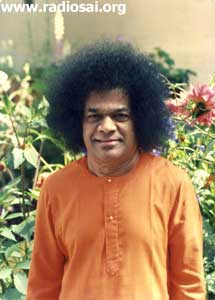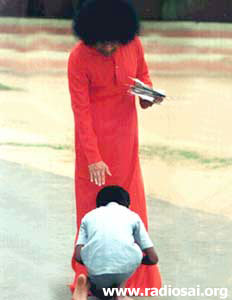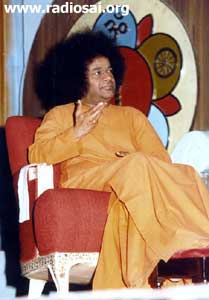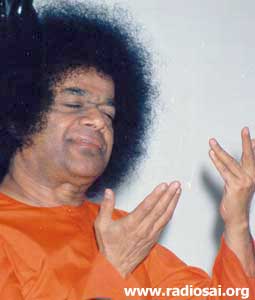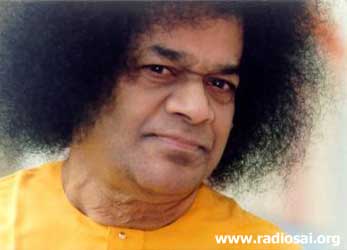 |
 |
 |
 |
| Volume 4 - Issue 08 AUGUST 2006 |
|
| CONVERSATIONS WITH SAI |
SAI: Surrender to God and to life means the absence of duality and being of the same nature as God. But such a state is beyond man's will. Surrender is when doer, deed, and object are all God. It cannot be forced. It comes naturally to a heart filled with love for God. God is as a spring of fresh and sweet water in the heart. The best tool to dig a well to that inexhaustible source and savour its sweetness is Japa, the repetition of the Name of the Lord. Dedicate every action to the Lord and there will be no place for ego. That is the quickest way for the ego to subside.
SAI: Sa' means divine. 'Ai' means mother. ‘Ram’ means ’He who is in the heart as pure delight’. ‘Sai Ram’ means Divine Mother and Father. Sohum, Sai Ram, Sivohum, Sambasiva, all mean the same. EXPAND YOUR HEART A Visitor: Baba, I am so tired. I am without energy. How may I get energy? SAI: Energy arises from surrender to God. A Visitor: Would it be all right for me to go for a reading from the book of Bhrighu? SAI: That is not Swami's business whether you go or not. What is written is true, but the interpretation is faulty. A Visitor: Baba, my energy? SAI: Energy comes from the heart expanding. A small, closed heart - no energy. If Baba is known in the heart, then the heart expands. Body is the temple, the heart is the seat; God is installed there. A Visitor: Are you satisfied? SAI: I am always happy. Love is my form. Always happy - sometimes to correct a situation, the sound of Swami's voice may change, but inside there is no anger.
SAI: God is positive. Man is negative. If contact is made, the divine current flows from positive to negative. For this reason, the Indians have the tradition of touching a divine person. But without some form of discipline and limitation, people would be touching the face and body. Hence, the custom of touching the lotus Feet. H: Swami says, 'keep water out of the boat'. How is that done? SAI: How can one keep water out of the boat of one's life? Turn fully to God and there is no boat, no boat is needed, God is in every place. The connection to Him is inside, in the heart. SADHANA AND LIBERATION H: Must a certain length of time pass before liberation? SAI: The time needed for liberation is like this. Somebody asks, 'How long do you need to eat?' The answer may be, 'Five minutes to half an hour.' It is wrong answer. It will take as long to eat as needed to fill the stomach. H: Is there naturally a desire for liberation in man?
In the following conversation a visitor, a prince from another state of India, came to Bhagavan, and offered some acres of land for a yoga centre. He asked that Bhagavan please visit his state and use His will to avert the danger of political violence. SAI: (to the visitor) Swami's love is the same for all, even for those who engage in bad actions. These suffer not because of Swami's anger, but because only through suffering do their minds turn inward in self-inquiry. And only through self-inquiry will they be free of the illusion that separates them from God. The only gift acceptable to Swami is the heart. Acres of land are of no interest to Him. Presently, there is great disorder amongst both politicians and students. This will continue for a time, but at a certain point Swami will step in and bring about so me order. H: How about order in America and Europe? SAI: Countries are like carriages. The engine is God. The first carriage is India. The other carriages will follow. According to the astrology of ancient times, the change in world conditions to be brought by Swami's influence will come in about 15 years (this conversation was in December 1968). This was predicted 5600 years ago in the Upanishads. The coming of Baba, the Sai Avathar, which includes the three incarnations, is all forecast quite clearly. People born in this present generation may consider themselves quite fortunate.
SEE ONLY THAT WHICH IS REAL SAI: Divine vision erases from the mind the seeing of that which is impermanent. Name, form and characteristic will in time disappear, so why wait? Erase them from the vision now. Erase them from the mind now and see only that which is real. Why bother about the illusion, that which disappears? It is far better to give one's time and attention to reality. Divine vision is seeing through the ephemeral illusion and abiding in and with the reality. God is the eternal reality. He is the changeless basis of every phenomenon. King Janaka became firmly established in the divine vision. Name, form, personality, attributes had been so thoroughly seen through that they never again came into his vision during the balance of his lifetime. Divine vision is the result of practice and of God's grace. At times, divine vision may appear to arise spontaneously, but it is because of work done by the person in a previous life. DIVINE VISION AND THE JIVANMUKTHA H: What is the difference between a person of divine vision and a person who is fully God-realized? SAI: There is a difference. The God-realised person, the Jivanmukta, no longer has any identification whatsoever with the body. He is one in whom only the divine vision is active. He pays no attention to the body, and it wastes away and dries up. He does not bother with food and water. They do not even come to mind. As a result, 21 days is the time that life can remain in the body under these circumstances. He has lost all body identification and neither eats nor drinks except when force fed. The 21 days may vary a little due to the condition of the person. King Janaka retired to the forest and became a Jivanmukta. Life remained in his body for 19 days. The person of divine vision is known as a Raja Yogi. He retains some body identification, and thus continues to live with the body. King Janaka reigned for many years as a Raja Yogi. Jivanmukti is permanent God-realization. It is merging with God. There can be a temporary God-realization for a few hours or a day or so in deep meditation, or at various levels of samadhi, but that is not permanent. It is not merging. H: Sorry, Swami, divine vision is still not clearly understood. SAI: There is a piece of clear glass. From one side one can look through and see the object on the other side. If the clear glass is plated with a silver film on one side, it becomes a mirror in which one may see himself; and objects on the other side of the mirror are not seen. Likewise, through consciousness one may see the outside sensory world. Or, with his intelligence, he may look to and become aware of that which may be found within himself. If one lives and keeps himself within the reality found within, with Godly thoughts, desires, and interests, if one keeps his life centered on the Godly side of consciousness, the consciousness becomes a mirror coated on its outer surface with the dust of the sensory world. On the pure inward surface of this mirror, on the pure mind and the pure heart, one may see the reality of himself reflected and this constitutes Self-realization. That is Raja Yoga. King Janaka became one who lived his life in this way.
SAI: The angry sages of the scriptures were in error in their sadhana. Their reactions were rajasic. The sathvic sadhanas are best; they give trouble to nobody. H: When reading, I found a passage saying that sage Viswamitra created a duplicate universe. Could such a thing be possible?
H: One would greatly wish to see God only. SAI: It is not that one takes every object in the world and changes it into God. One is not able to do that. It is not possible to take nature and all objects and make them one shade of colour? But if one puts on glasses of a certain colour, then everything is seen in that colour. One is able to change his eyes so that everything they see is that 'one colour', God. H: Swami says that all should be seen as God. One should also see his wife as God? SAI: Wife should not be seen as God. If so seen, she will sit on your head. She should be treated as wife. And God should be seen as her inner reality. (To be continued).... – Heart2Heart Team |
| You can write to us at : h2h@radiosai.org |
Vol 4 Issue 08 - AUGUST 2006
|
Best viewed in Internet Explorer - 1024 x 768 resolution. |
DHTML Menu by Milonic. |
